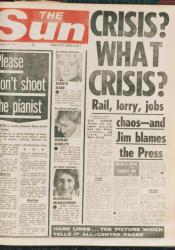The Winter of Discontent
The Winter of Discontent was a period of unrest, mainly centered around strikes against unfair wage restrictions, accompanied by storms that occurred during the winter of 1978-1979 in the United Kingdom. James Callaghan, prime minister and member of the “Labour” party during the Winter of Discontent, had put restrictions against wage increases into place in an attempt to combat inflation- a limit of 5% on wage increases. Some trade unions did not agree with the wage restriction, nor did a lot of union workers (which was over half the total workforce), so many ended up striking from November 1978 to February 1979. The strikes consisted of, but were not limited to: Ford Motor Company employees, drivers who transported goods, and even healthcare workers from around the country. The effects of these protests were amplified by the weather; the coldest UK winter in 16 years.
November saw hail and snow as well as lightning storms. In December, there was a lot of fog, sleet, and more snow. All the snow melted just before December 25th and did not return until the 29th. The weather on December 30th and 31st led to weather warnings and the isolation of small towns. Heathrow measured -3 degrees Celsius during the day of the 31st.
PM Callaghan was away for most of the winter, participating in an international summit in the Caribbean. Upon his return on January 10th, he confronted the press and said they were overexaggerating the crisis. This injured Callaghan’s public image and caused the Labour party to lose a lot of support, which didn’t directly lead but helped lead to a motion of no-confidence directed against Callaghan in March 1979. There was then an election that ended with Callaghan losing the seat of prime minister to Margaret Thatcher, a member of the conservative party. Thatcher inhibited trade unions’ power, as the Labour party’s unwillingness to put unions’ power in check was seen as one of the primary causes of the Winter of Discontent.
While the Winter of Discontent was certainly terrible, it was not as bad as some make it out to be. A common myth even today is that there were “bodies lining the streets”, food shortages, and trash piled high on the sidewalk. Why? Because history is written by the victor- Thatcher and the conservative party had sided themselves against these protests and middle class and won the office of prime minister after doing so. The media painted the protestors as greedy and governed by the unions they were part of. Today, some still use “Do you want another winter of 1978?” or “Do you want another Winter of Discontent?” as slogans against the Labour party and unions.
This government control of wages is a stark contrast to the Victorian era and the lack of regulation regarding child labor. The Winter of Discontent came about due to the government overstepping, restricting wage increases because they wanted to combat inflation and help the economy, while they didn’t regulate child labor at first because it was cheap labor and good for the economy.
https://www.historic-uk.com/HistoryUK/HistoryofBritain/Prime-Ministers-of-Britain/
https://www.oxfordreference.com/view/10.1093/oi/authority.20110803124216563
https://www.jstor.org/stable/27673141
https://peopleshistorynhs.org/encyclopaedia/the-winter-of-discontent-in-the-nhs/
https://www.mirror.co.uk/news/uk-news/dark-days-1970s-plagued-pub-25034880
https://en.wikipedia.org/wiki/1979_United_Kingdom_general_election
https://en.wikipedia.org/wiki/Winter_of_Discontent
https://books.google.com/books?id=wUp4BgAAQBAJ&lpg=PT92&pg=PT92#v=onepage&q&f=false

